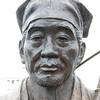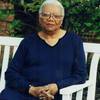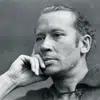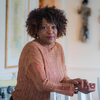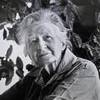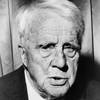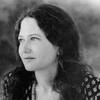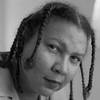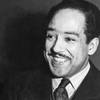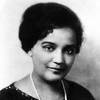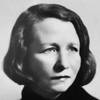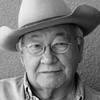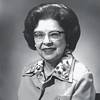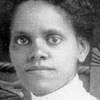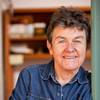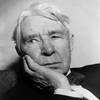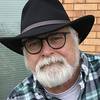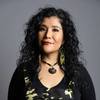Filter By
my grandfather and home
i
my grandfather used to count the days for return with his fingers
he then used stones to count
not enough
he used the clouds birds people
absence turned out to be too long
thirty six years until he died
for us now it is over seventy years
my grandpa lost his memory
he forgot the numbers the people
he forgot home
ii
i wish i were with you grandpa
i would have taught myself to write you
poems volumes of them and paint our home for you
i would have sewn you from soil
a garment decorated with plants
and trees you had grown
i would have made you
perfume from the oranges
and soap from the skys tears of joy
couldnt think of something purer
iii
i go to the cemetery every day
i look for your grave but in vain
are they sure they buried you
or did you turn into a tree
or perhaps you flew with a bird to the nowhere
iv
i place your photo in an earthenware pot
i water it every monday and thursday at sunset
i was told you used to fast those days
in ramadan i water it every day
for thirty days
or less or more
v
how big do you want our home to be
i can continue to write poems until you are satisfied
if you wish i can annex a neighboring planet or two
vi
for this home i shall not draw boundaries
no punctuation marks
When I Am Old
Years from now
when wrinkles
decorate my skin
like henna
when my bones rattle
mimicking a bag of coins
when my hair is no longer
full and thick
but these wisps of moon
I will shake my head
a wistful smile tugging
at the corner of my lips
taking a walk
down the streets of memories
I will wonder at younger me
who though she knew so much,
who knew she was confused,
who needed rules–if only to break them
I will wonder at the girl I once was
and think, “If only she knew what I know now,”
and be so thankful that she didn’t.
Bilingual
Because I speak Spanish
I can listen to my grandmother’s stories
and say familia, madre, amor.
Because I speak English
I can learn from my teacher
and say I love school.
Because I am bilingual
I can read libros and books,
I have amigos and friends,
I enjoy canciones and songs,
juegos and games,
and have twice as much fun.
And someday,
because I speak two languages,
I will be able to do twice as much,
to help twice as many people
and be twice as good in what I do.
A Blank White Page
is a meadow
after a snowfall
that a poem
hopes to cross
Ode to My Shoes
my shoes
rest
all night
under my bed
tired
they stretch
and loosen
their laces
wide open
they fall asleep
and dream
of walking
they revisit
the places
they went to
during the day
and wake up
cheerful
relaxed
so soft
Playgrounds
In summer I am very glad
We children are so small,
For we can see a thousand things
That men can't see at all.
They don't know much about the moss
And all the stones they pass:
They never lie and play among
The forests in the grass:
They walk about a long way off;
And, when we're at the sea,
Let father stoop as best he can
He can't find things like me.
But, when the snow is on the ground
And all the puddles freeze,
I wish that I were very tall,
High up above the trees.
Life Doesn't Frighten Me
Shadows on the wall
Noises down the hall
Life doesn't frighten me at all
Bad dogs barking loud
Big ghosts in a cloud
Life doesn't frighten me at all
Mean old Mother Goose
Lions on the loose
They don't frighten me at all
Dragons breathing flame
On my counterpane
That doesn't frighten me at all.
I go boo
Make them shoo
I make fun
Way they run
I won't cry
So they fly
I just smile
They go wild
Life doesn't frighten me at all.
Tough guys fight
All alone at night
Life doesn't frighten me at all.
Panthers in the park
Strangers in the dark
No, they don't frighten me at all.
That new classroom where
Boys all pull my hair
(Kissy little girls
With their hair in curls)
They don't frighten me at all.
Don't show me frogs and snakes
And listen for my scream,
If I'm afraid at all
It's only in my dreams.
I've got a magic charm
That I keep up my sleeve
I can walk the ocean floor
And never have to breathe.
Life doesn't frighten me at all
Not at all
Not at all.
Life doesn't frighten me at all.
Mr. Nobody
I know a funny little man,
As quiet as a mouse,
Who does the mischief that is done
In everybody’s house!
There’s no one ever sees his face,
And yet we all agree
That every plate we break was cracked
By Mr. Nobody.
’Tis he who always tears out books,
Who leaves the door ajar,
He pulls the buttons from our shirts,
And scatters pins afar;
That squeaking door will always squeak,
For prithee, don’t you see,
We leave the oiling to be done
By Mr. Nobody.
He puts damp wood upon the fire
That kettles cannot boil;
His are the feet that bring in mud,
And all the carpets soil.
The papers always are mislaid;
Who had them last, but he?
There’s no one tosses them about
But Mr. Nobody.
The finger marks upon the door
By none of us are made;
We never leave the blinds unclosed,
To let the curtains fade.
The ink we never spill; the boots
That lying round you see
Are not our boots,—they all belong
To Mr. Nobody.
Clatter
If I should list my favorite words,
They’d sound a lot like this:
Rumble, crash, snort, jangle, thump,
Roar, fizzle, splat, moo, hiss.
Not to mention gobble, clang,
Tweet, sputter, ticktock, growl;
Crackle, chirp, boom, whistle, wheeze,
Squawk, jingle, quack, thud, howl.
Then of course there’s grunt, toot, cuckoo,
Thunder, bang, pop, mush,
Rattle, splash, rip, ding-dong, and…
My parents’ favorite–Hush!
Break Free
I just want to be
where the earth breaks free
of concrete and metal and glass,
of asphalt and plastic and gas,
where sun is king
and water is queen,
where cactus grow tall
and the air is clean.
I just want to be
where the earth breaks free
of fences and alleys and walls,
of factories and traffic and malls,
where owls sleep
in the heat of day
waiting for sunset
to hunt their prey,
where mountains rise
in seas of sand
and coyotes roam
across the land.
This Room
The room I entered was a dream of this room.
Surely all those feet on the sofa were mine.
The oval portrait
of a dog was me at an early age.
Something shimmers, something is hushed up.
We had macaroni for lunch every day
except Sunday, when a small quail was induced
to be served to us. Why do I tell you these things?
You are not even here.
To You from Me
Like a message in a bottle that is
cast into the sea,
my poems are messages of hope
I send to you from me.
Hope that you’ll grow very wise
and also very strong–
wise to know what’s right, and strength
to choose it over wrong.
In each of them I search to find
exactly what to say
to help you laugh at all your fears
and rise to seize the day.
And so I send these little poems
because that’s what I do,
each nothing but a seed until
it finds a home in you.
I write because I love you.
I love you with all my heart.
And making poems, such as they are,
is how I do my part.
Heat waves shimmering
Translated by Robert Hass
Heat waves shimmering
one or two inches
above the dead grass.
Going Down Hill on a Bicycle
A Boy's Song
With lifted feet, hands still,
I am poised, and down the hill
Dart, with heedful mind;
The air goes by in a wind.
Swifter and yet more swift,
Till the heart with a mighty lift
Makes the lungs laugh, the throat cry:—
"O bird, see; see, bird, I fly.
"Is this, is this your joy?
O bird, then I, though a boy,
For a golden moment share
Your feathery life in air!"
Say, heart, is there aught like this
In a world that is full of bliss?
'Tis more than skating, bound
Steel-shod to the level ground.
Speed slackens now, I float
Awhile in my airy boat;
Till, when the wheels scarce crawl,
My feet to the treadles fall.
Alas, that the longest hill
Must end in a vale; but still,
Who climbs with toil, wheresoe'er,
Shall find wings waiting there.
About Standing (in Kinship)
We all have the same little bones in our foot
twenty-six with funny names like navicular.
Together they build something strong—
our foot arch a pyramid holding us up.
The bones don’t get casts when they break.
We tape them—one phalange to its neighbor for support.
(Other things like sorrow work that way, too—
find healing in the leaning, the closeness.)
Our feet have one quarter of all the bones in our body.
Maybe we should give more honor to feet
and to all those tiny but blessed cogs in the world—
communities, the forgotten architecture of friendship.
The Ecchoing Green
The sun does arise,
And make happy the skies.
The merry bells ring
To welcome the Spring.
The sky-lark and thrush,
The birds of the bush,
Sing louder around,
To the bells’ cheerful sound.
While our sports shall be seen
On the Ecchoing Green.
Old John, with white hair
Does laugh away care,
Sitting under the oak,
Among the old folk,
They laugh at our play,
And soon they all say.
‘Such, such were the joys.
When we all girls & boys,
In our youth-time were seen,
On the Ecchoing Green.’
Till the little ones weary
No more can be merry
The sun does descend,
And our sports have an end:
Round the laps of their mothers,
Many sisters and brothers,
Like birds in their nest,
Are ready for rest;
And sport no more seen,
On the darkening Green.
The World Is in Pencil
—not pen. It’s got
that same silken
dust about it, doesn’t it,
that same sense of
having been roughed
onto paper even
as it was planned.
It had to be a labor
of love. It must’ve
taken its author some
time, some shove.
I’ll bet it felt good
in the hand—the o
of the ocean, and
the and and the and
of the land.
School—12:15
Imagine the lunchroom,
crowded and wary—
seating charts a welcome apprehension.
Loose-leaf
papers spiraled from
ballpoint-scratched notebook covers
until the last hour,
when a teacher
sighed and sighed.
Today, we close our backpacks,
but minutes
come quick and quit
the ease of dawn.
Activism, Everywhere
Our voice
Is our greatest power
When we stand together
We can speak up against mistreatment
We are saying that we will not be silent about the mistreatment of people
We are saying we will not be silent
We are standing tall and firm because we believe in equity and equality
We are standing tall and firm
We are not yielding or bending because the conversation is uncomfortable
We are not yielding or bending
We understand activism happens online and offline
In the streets picketing
And in the classroom teaching
On the blogs writing
On the internet sharing information
It happens everywhere
It is active
It is energy
It is resisting to be comfortable
When we all have yet to feel safe and free
Jabberwocky
’Twas brillig, and the slithy toves
Did gyre and gimble in the wabe:
All mimsy were the borogoves,
And the mome raths outgrabe.
“Beware the Jabberwock, my son!
The jaws that bite, the claws that catch!
Beware the Jubjub bird, and shun
The frumious Bandersnatch!”
He took his vorpal sword in hand;
Long time the manxome foe he sought—
So rested he by the Tumtum tree
And stood awhile in thought.
And, as in uffish thought he stood,
The Jabberwock, with eyes of flame,
Came whiffling through the tulgey wood,
And burbled as it came!
One, two! One, two! And through and through
The vorpal blade went snicker-snack!
He left it dead, and with its head
He went galumphing back.
“And hast thou slain the Jabberwock?
Come to my arms, my beamish boy!
O frabjous day! Callooh! Callay!”
He chortled in his joy.
’Twas brillig, and the slithy toves
Did gyre and gimble in the wabe:
All mimsy were the borogoves,
And the mome raths outgrabe.
The Crocodile
How doth the little crocodile
Improve his shining tail,
And pour the waters of the Nile
On every golden scale!
How cheerfully he seems to grin,
How neatly spreads his claws,
And welcomes little fishes in,
With gently smiling jaws!
[ if mama / could see ]
if mama
could see
she would see
lucy sprawling
limbs of lucy
decorating the
backs of chairs
lucy hair
holding the mirrors up
that reflect odd
aspects of lucy.
if mama
could hear
she would hear
lucysong rolled in the
corners like lint
exotic webs of lucysighs
long lucy spiders explaining
to obscure gods.
if mama
could talk
she would talk
good girl
good girl
good girl
clean up your room.
Myself with Cats
Hanging out the wash, I visit the cats.
"I don't belong to nobody," Yang insists vulgarly.
"Yang," I reply, "you don't know nothing."
Yin, an orange tabby, agrees
but puts kindness ahead of rigid truth.
I admire her but wish she wouldn't idolize
the one who bullies her. I once did that.
Her silence speaks needles when Yang thrusts
his ugly tortoiseshell body against hers,
sprawled in my cosmos. "Really, I don't mind,"
she purrs—her eyes horizontal, her mouth
an Ionian smile, her legs crossed nobly
in front of her, a model of cat Nirvana—
"withholding his affection, he made me stronger.'
The Orange
At lunchtime I bought a huge orange
The size of it made us all laugh.
I peeled it and shared it with Robert and Dave—
They got quarters and I had a half.
And that orange it made me so happy,
As ordinary things often do
Just lately. The shopping. A walk in the park
This is peace and contentment. It’s new.
The rest of my day was quite easy.
I did all my jobs on my list
And enjoyed them and had some time over.
I love you. I’m glad I exist.
NUMBERS
I like the generosity of numbers.
The way, for example,
they are willing to count
anything or anyone:
two pickles, one door to the room,
eight dancers dressed as swans.
I like the domesticity of addition—
add two cups of milk and stir—
the sense of plenty: six plums
on the ground, three more
falling from the tree.
And multiplication’s school
of fish times fish,
whose silver bodies breed
beneath the shadow
of a boat.
Even subtraction is never loss,
just addition somewhere else:
five sparrows take away two,
the two in someone else’s
garden now.
There’s an amplitude to long division,
as it opens Chinese take-out
box by paper box,
inside every folded cookie
a new fortune.
And I never fail to be surprised
by the gift of an odd remainder,
footloose at the end:
forty-seven divided by eleven equals four,
with three remaining.
Three boys beyond their mother’s call,
two Italians off to the sea,
one sock that isn't anywhere you look.
[2 little whos]
2 little whos
(he and she)
under are this
wonderful tree
smiling stand
(all realms of where
and when beyond)
now and here
(far from a grown
-up i&you-
ful world of known
who and who
(2 little arms
and over them this
aflame with dream
incredible is)
anyone lived in a pretty how town
anyone lived in a pretty how town
(with up so floating many bells down)
spring summer autumn winter
he sang his didn't he danced his did.
Women and men(both little and small)
cared for anyone not at all
they sowed their isn't they reaped their same
sun moon stars rain
children guessed(but only a few
and down they forgot as up they grew
autumn winter spring summer)
that noone loved him more by more
when by now and tree by leaf
she laughed his joy she cried his grief
bird by snow and stir by still
anyone's any was all to her
someones married their everyones
laughed their cryings and did their dance
(sleep wake hope and then)they
said their nevers they slept their dream
stars rain sun moon
(and only the snow can begin to explain
how children are apt to forget to remember
with up so floating many bells down)
one day anyone died i guess
(and noone stooped to kiss his face)
busy folk buried them side by side
little by little and was by was
all by all and deep by deep
and more by more they dream their sleep
noone and anyone earth by april
wish by spirit and if by yes.
Women and men(both dong and ding)
summer autumn winter spring
reaped their sowing and went their came
sun moon stars rain
“Hope” is the thing with feathers - (314)
“Hope” is the thing with feathers -
That perches in the soul -
And sings the tune without the words -
And never stops - at all -
And sweetest - in the Gale - is heard -
And sore must be the storm -
That could abash the little Bird
That kept so many warm -
I’ve heard it in the chillest land -
And on the strangest Sea -
Yet - never - in Extremity,
It asked a crumb - of me.
I’m Nobody! Who are you?
I'm Nobody! Who are you?
Are you – Nobody – too?
Then there's a pair of us!
Don't tell! they'd advertise – you know!
How dreary – to be – Somebody!
How public – like a Frog –
To tell one's name – the livelong June –
To an admiring Bog!
They shut me up in Prose
They shut me up in Prose –
As when a little Girl
They put me in the Closet –
Because they liked me “still” –
Still! Could themself have peeped –
And seen my Brain – go round –
They might as wise have lodged a Bird
For Treason – in the Pound –
Himself has but to will
And easy as a Star
Look down opon Captivity –
And laugh – No more have I –
Excerpt from “From the Lives of My Friends”
What are the birds called
in that neighborhood
The dogs
There were dogs flying
from branch to
branch
My friends and I climbed up the telephone poles to sit on the power lines dressed like
crows
Their voices sounded like lemons
They were a smooth sheet
They grew
black feathers
Not frightening at all
but beautiful, shiny and
full of promise
What kind of light
is that?
Happenstance
When you appeared it was as if
magnets cleared the air.
I had never seen that smile before
or your hair, flying silver. Someone
waving goodbye, she was silver, too.
Of course you didn’t see me.
I called softly so you could choose
not to answer—then called again.
You turned in the light, your eyes
seeking your name.
Poet Dances with Inanimate Object
for Jim Schley
The umbrella, in this case;
Earlier, the stool, the
Wooden pillars that hold up
the roof.
This guy, you realize,
Will dance with anything—
—He likes the idea.
Then he picks up some lady’s discarded sandals,
Holds them next to his head like sea shells,
Donkey ears.
Nothing,
his body states,
Is safe from the dance of ideas!
Turtle Came to See Me
The first story I ever write
is a bright crayon picture
of a dancing tree, the branches
tossed by island wind.
I draw myself standing beside the tree,
with a colorful parrot soaring above me,
and a magical turtle clasped in my hand,
and two yellow wings fluttering
on the proud shoulders of my ruffled
Cuban rumba dancer's
fancy dress.
In my California kindergarten class,
the teacher scolds me: REAL TREES
DON'T LOOK LIKE THAT.
It's the moment
when I first
begin to learn
that teachers
can be wrong.
They have never seen
the dancing plants
of Cuba.
Weighing In
What the scale tells you is how much the earth
has missed you, body, how it wants you back
again after you leave it to go forth
into the light. Do you remember how
earth hardly noticed you then? Others would rock
you in their arms, warm in the flow
that fed you, coaxed you upright. Then earth began
to claim you with spots and fevers, began to lick
at you with a bruised knee, a bloody shin,
and finally to stoke you, body, drumming
intimate coded messages through music
you danced to unawares, there in your dreaming
and your poems and your obedient blood.
Body, how useful you became, how lucky,
heavy with news and breakage, rich, and sad,
sometimes, imagining that greedy zero
you must have been, that promising empty sack
of possibilities, never-to-come tomorrow.
But look at you now, body, soft old shoe
that love wears when it’s stirring, look down, look
how earth wants what you weigh, needs what you know.
Punctuation
Translated by Sandra Tamele and Eric M. B. Becker
Without commas in her gaze,
the little girl dribbles colons with each breath
and swears an exclamation mark
is a lollipop:
“Is growing up for real or make-believe?”
Dot dot dot, I gasped.
A question mark is a fisherman’s hook.
I’d taken the bait of uncertainty,
when she offered me as consolation,
wrapped in quotation marks, a single Smartie.
Little Talk
Don't you think it's probable
that beetles, bugs, and bees
talk about a lot of things -
you know, such things as these:
The kind of weather where they live
in jungles tall with grass,
and earthquakes in their villages
whenever people pass.
Of course, we'll never know if bugs
talk very much at all -
because our rears are far too big
for talk that is so small.
Nothing Gold Can Stay
Nature’s first green is gold,
Her hardest hue to hold.
Her early leaf’s a flower;
But only so an hour.
Then leaf subsides to leaf.
So Eden sank to grief,
So dawn goes down to day.
Nothing gold can stay.
The Song of the Feet
It is appropriate that I sing
The song of the feet
The weight of the body
And what the body chooses to bear
Fall on me
I trampled the American wilderness
Forged frontier trails
Outran the mob in Tulsa
Got caught in Philadelphia
And am still unreparated
I soldiered on in Korea
Jungled through Vietnam sweated out Desert Storm
Caved my way through Afghanistan
Tunneled the World Trade Center
And on the worst day of my life
Walked behind JFK
Shouldered MLK
Stood embracing Sister Betty
I wiggle my toes
In the sands of time
Trusting the touch that controls my motion
Basking in the warmth of the embrace
Day’s end offers with warm salty water
It is appropriate I sing
The praise of the feet
I am a Black woman
Harriet Tubman
Harriet Tubman didn't take no stuff
Wasn't scared of nothing neither
Didn't come in this world to be no slave
And wasn't going to stay one either
"Farewell!" she sang to her friends one night
She was mighty sad to leave 'em
But she ran away that dark, hot night
Ran looking for her freedom
She ran to the woods and she ran through the woods
With the slave catchers right behind her
And she kept on going till she got to the North
Where those mean men couldn't find her
Nineteen times she went back South
To get three hundred others
She ran for her freedom nineteen times
To save Black sisters and brothers
Harriet Tubman didn't take no stuff
Wasn't scared of nothing neither
Didn't come in this world to be no slave
And didn't stay one either
And didn't stay one either
In the Land of Words
In the land
of words,
I stand as still
as a tree,
and let the words
rain down on me.
Come, rain, bring
your knowledge and your
music. Sing
while I grow green
and full.
I'll stand as still
as a tree,
and let your blessings
fall on me.
Cat Scat
I am watching Cleo listening, our cat
listening to Mozart's Magic Flute. What
can she be hearing? What
can the air carry into her ears like that,
her ears swivelling like radio dishes that
are tuned to all the noise of the world, flat
and sharp, high and low, a scramble of this and that
she can decode like nobody's business, acrobat
of random airs as she is? Although of course a bat
is better at it, sifting out of its acoustic habitat
the sound of the very shape of things automat-
ically—and on the wing, at that. The Magic Flute! What
a joy it is, I feel, and wonder (to end this little scat)
does, or can, the cat.
The Last Word
I am a door of metaphor
waiting to be opened.
You’ll find no lock, no key.
All are free to enter, at will.
Simply step over the threshold.
Remember to dress for travel, though.
Visitors have been known
to get carried away.
Clarinet
Apart, we are two quiet things:
a person and an instrument.
I in my body,
the clarinet in its case.
We are like good friends.
The clarinet takes nothing away from me.
It lets me borrow its notes.
If I loan it my breath,
I can speak with its sweet voice.
Together, we will make a world
full of song.
Love Letter
I’d like to be a shrine, so I can learn from peoples’ prayers the story of hearts. I’d like to be a scarf so I can place it over my hair and understand other worlds. I’d like to be the voice of a soprano singer so I can move through all borders and see them vanish with every spell-binding note. I’d like to be light so I illuminate the dark. I’d like to be water to fill bodies so we can gently float together indefinitely. I’d like to be a lemon, to be zest all the time, or an olive tree to shimmer silver on the earth. Most of all, I’d like to be a poem, to reach your heart and stay.
Others Are Us
He said I was different because I was dark. She said I was different because I wore a scarf. He said I was different because I had an accent. She said I was different because I couldn’t read. He said I was different because I stuttered. She said I was different because I couldn’t hear or speak. He said I was different because I should be a girl. She said I was different because I should be a boy. We are all different so doesn’t that mean we are the same? I mean it’s like heartbeats, we all share the same beats per minute but not exactly.
Remember
Remember the sky that you were born under,
know each of the star's stories.
Remember the moon, know who she is.
Remember the sun's birth at dawn, that is the
strongest point of time. Remember sundown
and the giving away to night.
Remember your birth, how your mother struggled
to give you form and breath. You are evidence of
her life, and her mother's, and hers.
Remember your father. He is your life, also.
Remember the earth whose skin you are:
red earth, black earth, yellow earth, white earth
brown earth, we are earth.
Remember the plants, trees, animal life who all have their
tribes, their families, their histories, too. Talk to them,
listen to them. They are alive poems.
Remember the wind. Remember her voice. She knows the
origin of this universe.
Remember you are all people and all people
are you.
Remember you are this universe and this
universe is you.
Remember all is in motion, is growing, is you.
Remember language comes from this.
Remember the dance language is, that life is.
Remember.
Mosquitoes
Mosquitoes,
with needle-noses
sucking blood
from elbows, cheeks, and chin
why were you not
designed to thrive
on brine, on swine,
or likewise-spiny
porcupines?
SLAP!
SLAP!
SLAP!
Laughing Out Loud, I Fly
Laughing out loud, I fly, toward the good things,
to catch Mamá Lucha on the sidewalk, after
school, waiting for the green-striped bus,
on the side of the neighborhood store, next to almonds,
José’s tiny wooden mule, the wiseboy from San Diego,
teeth split apart, like mine in the coppery afternoon
it’s about 3, the fly smears my ear, but I jump
I am a monkey cartoon or a chile tamal, crazy
with paisley patches, infinite flavors cinnamon &
banana ice cream, it’s 3 in the afternoon, no, at 5
my mother says she will call me
& arrive, a rainbow.
The Promise
Stay, I said
to the cut flowers.
They bowed
their heads lower.
Stay, I said to the spider,
who fled.
Stay, leaf.
It reddened,
embarrassed for me and itself.
Stay, I said to my body.
It sat as a dog does,
obedient for a moment,
soon starting to tremble.
Stay, to the earth
of riverine valley meadows,
of fossiled escarpments,
of limestone and sandstone.
It looked back
with a changing expression, in silence.
Stay, I said to my loves.
Each answered,
Always.
You and I
Only one I in the whole wide world
And millions and millions of you,
But every you is an I to itself
And I am a you to you, too!
But if I am a you and you are an I
And the opposite also is true,
It makes us both the same somehow
Yet splits us each in two.
It’s more and more mysterious,
The more I think it through:
Every you everywhere in the world is an I;
Every I in the world is a you!
Appalachian Elegy (8.)
snow-covered earth
such silence
still divine presence
echoes immortal migrants
all life sustained
darkness comes
suffering touches us
again and again
there is pain
there in the midst of
such harsh barrenness
a cardinal framed in the glass
red light
calling away despair
eternal promise
everything changes and ends
Langston
Who would have known
a young lad
delivering
door-to-door newspapers
in a small town
would one day
see people the world over
carrying his papers–
his reams of poems–
poems about–
rainy sidewalks,
stormy seas,
crystal stair memories,
moon-glimmers,
moonbeams,
but best of all,
his dusts of dreams.
April Rain Song
Let the rain kiss you
Let the rain beat upon your head with silver liquid drops
Let the rain sing you a lullaby
The rain makes still pools on the sidewalk
The rain makes running pools in the gutter
The rain plays a little sleep song on our roof at night
And I love the rain.
Harlem
What happens to a dream deferred?
Does it dry up
like a raisin in the sun?
Or fester like a sore—
And then run?
Does it stink like rotten meat?
Or crust and sugar over—
like a syrupy sweet?
Maybe it just sags
like a heavy load.
Or does it explode?
anthem for my belly after eating too much
i look in the mirror, and all the chips i’ve eaten
this month have accumulated
like schoolwork at the bottom of my tummy,
my belly—a country i’m trying to love.
my mouth is a lover devoted to you, my belly, my belly
the birds will string a song together
with wind for you and your army
of solids, militia of grease.
americans love excess, but we also love jeans,
and refuse to make excess comfortable in them.
i step into a fashionable prison,
my middle managed and fastened into
suffering. my gracious gut,
dutiful dome, i will wear a house for you
that you can live in, promise walls
that embrace your growing flesh,
and watch you reach toward everything possible.
Your World
Your world is as big as you make it.
I know, for I used to abide
In the narrowest nest in a corner,
My wings pressing close to my side.
But I sighted the distant horizon
Where the skyline encircled the sea
And I throbbed with a burning desire
To travel this immensity.
I battered the cordons around me
And cradled my wings on the breeze,
Then soared to the uttermost reaches
With rapture, with power, with ease!
I Ask My Mother to Sing
She begins, and my grandmother joins her.
Mother and daughter sing like young girls.
If my father were alive, he would play
his accordion and sway like a boat.
I’ve never been in Peking, or the Summer Palace,
nor stood on the great Stone Boat to watch
the rain begin on Kuen Ming Lake, the picnickers
running away in the grass.
But I love to hear it sung;
how the waterlilies fill with rain until
they overturn, spilling water into water,
then rock back, and fill with more.
Both women have begun to cry.
But neither stops her song.
Everything Is a Poem
A garden is a poem
Lined with rows of similes
Like lyrical chrysanthemums
And epic peonies.
A spider web’s a poem
Composed upon the air,
Silk-designed and deftly lined to
catch the unaware.
A mirror is a poem
Revealing truths about
The poet, but it often leaves
The shadow of a doubt.
A firefly’s a poem,
A flashy verse sublime
That’s ready by other fireflies
One sparkle at a time.
A picture is a poem
If it’s painted in disguise
On a canvas of emotion
From a palette of surprise.
A rainbow is a poem
A phenomenon so rare,
It’s not that it is written
But is written on the air.
A shining star’s a poem
Penned by ghostwriter, the Moon,
Who publishes her verses
In a book called Clair de Lune.
A busy bee’s a poem
With nectar that’s so fine
A reader-eater laps up every
Honey of a line.
Places and Names: A Traveler's Guide
So many places have fabulous names,
Like Fried, North Dakota,
The Court of St. James,
Siberia, Nigeria, Elyria, Peru
The White Nile, Black Sea,
And Kalamazoo!
The Great Wall of China, South Pole and Loch Ness,
And 104 Fairview—that's my address!
Thousands of spaces are places to be—
Discover the World of GE-OG-RA-PHY!
Travel by boat or by car or by plane
To visit East Africa, Singapore, Spain.
Go by yourself or invite a good friend,
But traveling by poem is what I recommend.
How to Triumph Like a Girl
I like the lady horses best,
how they make it all look easy,
like running 40 miles per hour
is as fun as taking a nap, or grass.
I like their lady horse swagger,
after winning. Ears up, girls, ears up!
But mainly, let’s be honest, I like
that they’re ladies. As if this big
dangerous animal is also a part of me,
that somewhere inside the delicate
skin of my body, there pumps
an 8-pound female horse heart,
giant with power, heavy with blood.
Don’t you want to believe it?
Don’t you want to lift my shirt and see
the huge beating genius machine
that thinks, no, it knows,
it’s going to come in first.
Grand Slam
Dreams brimming over,
childhood stretched out in legs,
this is the moment replayed on winter days
when frost covers the field,
when age steals away wishes.
Glorious sleep that seeps back there
to the glory of our baseball days.
The Quiet World
In an effort to get people to look
into each other’s eyes more,
and also to appease the mutes,
the government has decided
to allot each person exactly one hundred
and sixty-seven words, per day.
When the phone rings, I put it to my ear
without saying hello. In the restaurant
I point at chicken noodle soup.
I am adjusting well to the new way.
Late at night, I call my long distance lover,
proudly say I only used fifty-nine today.
I saved the rest for you.
When she doesn’t respond,
I know she’s used up all her words,
so I slowly whisper I love you
thirty-two and a third times.
After that, we just sit on the line
and listen to each other breathe.
How To Eat a Poem
Don't be polite.
Bite in.
Pick it up with your fingers and lick the juice that
may run down your chin.
It is ready and ripe now, whenever you are.
You do not need a knife or fork or spoon
or plate or napkin or tablecloth.
For there is no core
or stem
or rind
or pit
or seed
or skin
to throw away.
First Fig
My candle burns at both ends;
It will not last the night;
But ah, my foes, and oh, my friends—
It gives a lovely light!
A Simile
What did we say to each other
that now we are as the deer
who walk in single file
with heads high
with ears forward
with eyes watchful
with hooves always placed on firm ground
in whose limbs there is latent flight
I Left My Head
I left my head
somewhere
today.
Put it down for
just
a minute.
Under the
table?
On a chair?
Wish I were
able
to say
where.
Everything I need
is
in it!
In the Blood
The brown-eyed child
and the white-haired grandfather
dance in the silent afternoon
They snap their fingers
to a rhythm only those
who love can hear,
The Only Me
Spinning through space for eons,
our earth—oceans, rivers, mountains,
glaciers, tigers, parrots, redwoods—
evolving wonders.
And our vast array, generations
of humans—all shapes, colors, languages.
Can I be the only me?
Our earth: so much beauty, hate,
goodness, greed.
“Study. Cool the climate,” advises my teacher.
“Grow peace.”
Can I be the only me,
become all my unique complexity?
The Song Is You
Musical instruments sleep in the dark
for several hours a day:
the folks we belong to aren't always at play,
so we can't always be at work.
Our silence holds music: an undiscovered bourne,
horizons which have never been viewed,
like undeclared love growing deeper in solitude,
or the crystalline heart of a stone.
My sleep, however, was more like a death:
in the dark of an attic for years;
forgetting my existence, and my glorious career
with the best female swing band on the earth.
I was the great love of my Sweetheart's life.
A man came between us. And soon
I was in the dark collecting dust and out of tune;
they were pronounced man and wife.
Instead of the charts, my gal read Dr. Spock.
We played once a week, once a year . . .
At first, from my closet, I was able to hear
her family's coninuo of talk.
My Sweetheart's grandson brought me to the shop.
Something has ruined my voice.
Older, not riper, I'm a sorry old bass.
But that doesn't mean I've lost hope
. . .that someone will hold me in a tender embrace,
her arms will encircle my neck;
someone will press her warm length to my back,
and pluck notes from my gut with her fingers' caress.
Sunset
Since Poets have told of sunset,
What is left for me to tell?
I can only say that I saw the day
Press crimson lips to the horizon gray,
And kiss the earth farewell.
Baked Goods
Flour on the floor makes my sandals
slip and I tumble into your arms.
Too hot to bake this morning but
blueberries begged me to fold them
into moist muffins. Sticks of rhubarb
plotted a whole pie. The windows
are blown open and a thickfruit tang
sneaks through the wire screen
and into the home of the scowly lady
who lives next door. Yesterday, a man
in the city was rescued from his apartment
which was filled with a thousand rats.
Something about being angry because
his pet python refused to eat. He let the bloom
of fur rise, rise over the little gnarly blue rug,
over the coffee table, the kitchen countertops
and pip through each cabinet, snip
at the stumpy bags of sugar,
the cylinders of salt. Our kitchen is a riot
of pots, wooden spoons, melted butter.
So be it. Maybe all this baking will quiet
the angry voices next door, if only
for a brief whiff. I want our summers
to always be like this—a kitchen wrecked
with love, a table overflowing with baked goods
warming the already warm air. After all the pots
are stacked, the goodies cooled, and all the counters
wiped clean—let us never be rescued from this mess.
We Have Been Friends Together
We have been friends together,
In sunshine and in shade;
Since first beneath the chestnut-trees
In infancy we played.
But coldness dwells within thy heart,
A cloud is on thy brow;
We have been friends together—
Shall a light word part us now?
We have been gay together;
We have laugh'd at little jests;
For the fount of hope was gushing
Warm and joyous in our breasts.
But laughter now hath fled thy lip,
And sullen glooms thy brow;
We have been gay together—
Shall a light word part us now?
We have been sad together,
We have wept, with bitter tears,
O'er the grass-grown graves, where slumber'd
The hopes of early years.
The voices which are silent there
Would bid thee clear thy brow;
We have been sad together—
Oh! what shall part us now?
Excerpt from "Every day as a wide field, every page"
And there were so many more poems to read!
Countless friends to listen to.
We didn’t have to be in the same room—
the great modern magic.
Everywhere together now.
Even scared together now
from all points of the globe
which lessened it somehow.
Hopeful together too, exchanging
winks in the dark, the little lights blinking.
When your hope shrinks
you might feel the hope of
someone far away lifting you up.
Hope is the thing ...
Hope was always the thing!
What else did we give each other
from such distances?
Breath of syllables,
sing to me from your balcony
please! Befriend me
in the deep space.
When you paused for a poem
it could reshape the day
you had just been living.
Kindness
Before you know what kindness really is
you must lose things,
feel the future dissolve in a moment
like salt in a weakened broth.
What you held in your hand,
what you counted and carefully saved,
all this must go so you know
how desolate the landscape can be
between the regions of kindness.
How you ride and ride
thinking the bus will never stop,
the passengers eating maize and chicken
will stare out the window forever.
Before you learn the tender gravity of kindness
you must travel where the Indian in a white poncho
lies dead by the side of the road.
You must see how this could be you,
how he too was someone
who journeyed through the night with plans
and the simple breath that kept him alive.
Before you know kindness as the deepest thing inside,
you must know sorrow as the other deepest thing.
You must wake up with sorrow.
You must speak to it till your voice
catches the thread of all sorrows
and you see the size of the cloth.
Then it is only kindness that makes sense anymore,
only kindness that ties your shoes
and sends you out into the day to gaze at bread,
only kindness that raises its head
from the crowd of the world to say
It is I you have been looking for,
and then goes with you everywhere
like a shadow or a friend.
Ode of Girls' Things
I loved the things that were ours—pink gloves,
hankies with a pastoral scene in one corner.
There was a lot we were not allowed to do,
but what we were allowed to do was ours,
dolls you carry by the leg, and dolls’
clothes you would put on or take off—
someone who was yours, who did not
have the rights of her own nakedness,
and who had a smooth body, with its
untouchable place, which you would never touch, even on her,
you had been cured of that.
And some of the dolls had hard-rubber hands, with
dimples, and though you were not supposed to, you could
bite off the ends of the fingers when you could not stand it.
And though you’d never be allowed to, say, drive a bus,
or do anything that had to be done right, there was a
teeny carton, in you, of eggs
so tiny they were invisible.
And there would be milk, in you, too—real
milk! And you could wear a skirt, you could
be a bellflower—up under its
cone the little shape like a closed
buckle, intricate groove and tongue,
where something like God’s power over you lived. And it
turned out
you shared some things with boys—
the alphabet was not just theirs—
and you could make forays over into their territory,
you could have what you could have because it was yours,
and a little of what was theirs, because
you took it. Much later, you’d have to give things
up, too, to make it fair—long
hair, skirts, even breasts, a pair
of raspberry colored pumps which a friend
wanted to put on, if they would fit his foot, and they did.
How lucky we are that you can’t sell a poem
How lucky we are
That you can’t sell
A poem, that it has
No value. Might
As well
Give it away.
That poem you love,
That saved your life,
Wasn’t it given to you?
Wish
For someone to read a poem
again, and again, and then,
having lifted it from page
to brain—the easy part—
cradle it on the longer trek
from brain all the way to heart.
I Wave Good-bye When Butter Flies
I wave good-bye when butter flies
and cheer a boxing match,
I've often watched my pillow fight,
I've sewn a cabbage patch,
I like to dance at basket balls
or lead a rubber band,
I've marvelled at a spelling bee,
I've helped a peanut stand.
It's possible a pencil points,
but does a lemon drop?
Does coffee break or chocolate kiss,
and will a soda pop?
I share my milk with drinking straws,
my meals with chewing gum,
and should I see my pocket change,
I'll hear my kettle drum.
It makes me sad when lettuce leaves,
I laugh when dinner rolls,
I wonder if the kitchen sinks
and if a salad bowls,
I've listened to a diamond ring,
I've waved a football fan,
and if a chimney sweeps the floor,
I'm sure the garbage can.
Don't Go Into the Library
The library is dangerous—
Don’t go in. If you do
You know what will happen.
It’s like a pet store or a bakery—
Every single time you’ll come out of there
Holding something in your arms.
Those novels with their big eyes.
And those no-nonsense, all muscle
Greyhounds and Dobermans,
All non-fiction and business,
Cuddly when they’re young,
But then the first page is turned.
The doughnut scent of it all, knowledge,
The aroma of coffee being made
In all those books, something for everyone,
The deli offerings of civilization itself.
The library is the book of books,
Its concrete and wood and glass covers
Keeping within them the very big,
Very long story of everything.
The library is dangerous, full
Of answers. If you go inside,
You may not come out
The same person who went in.
Funny Bone (Humerus)
Your upper arm, the humerus,
has no idea what’s funny:
slip on a dropped banana peel,
invent something punny,
make your hand and armpit squeal–
how can it tell what’s humorous?
Even though your humeri
have biceps with a belly
they’re not for making belly laughs.
That name is simply silly!
Did someone on the O.R. staff,
thinking it’d be humorous
in the midst of a humorless
dissection, to make a pun
about the bone and how it hurts
like crazy when you stun
that tender elbow nerve that blurts
out PAIN and, more or less,
turns you into pancake batter?
That bone’s no laughing matter.
Somewhere or Other
Somewhere or other there must surely be
The face not seen, the voice not heard,
The heart that not yet—never yet—ah me!
Made answer to my word.
Somewhere or other, may be near or far;
Past land and sea, clean out of sight;
Beyond the wandering moon, beyond the star
That tracks her night by night.
Somewhere or other, may be far or near;
With just a wall, a hedge, between;
With just the last leaves of the dying year
Fallen on a turf grown green.
Who Has Seen the Wind?
Who has seen the wind?
Neither I nor you:
But when the leaves hang trembling,
The wind is passing through.
Who has seen the wind?
Neither you nor I:
But when the trees bow down their heads,
The wind is passing by.
Turtle
Who would be a turtle who could help it?
A barely mobile hard roll, a four-oared helmet,
She can ill afford the chances she must take
In rowing toward the grasses that she eats.
Her track is graceless, like dragging
A packing-case places, and almost any slope
Defeats her modest hopes. Even being practical,
She’s often stuck up to the axle on her way
To something edible. With everything optimal,
She skirts the ditch which would convert
Her shell into a serving dish. She lives
Below luck-level, never imagining some lottery
Will change her load of pottery to wings.
Her only levity is patience,
The sport of truly chastened things.
Mi Casa
When I was a boy
I was either a child eating bugs
or a child being eaten by bugs, but
now that I am older am I a man
who devours the world or am I a man
being devoured by the world?
Someone once told me that mothers
come from a different planet. And if she was correct
then my mother was a warrior from that planet.
And now that my mother is older the history
that is her face is starting to look like a worn map.
The hills that once were her cheeks now have roads
carved into them that tell her secrets.
The roots of her hair are starting to shimmer with silver
that she colors once she sees ten or more.
She no longer cares for long hair.
She says pelo largo is a young woman’s game.
In a few years she will be older than my grandmother
ever was.
Humdrum
If I had a million lives to live
and a million deaths to die
in a million humdrum worlds,
I’d like to change my name
and have a new house number to go by
each and every time I died
and started life all over again.
I wouldn’t want the same name every time
and the same old house number always,
dying a million deaths,
dying one by one a million times:
—would you?
or you?
or you?
My Locker
My lockers filled with lots of things
like golden crowns from queens and kings,
a heated brush for ice and snow,
Connect the Dots and Tic Tac Toe,
a crystal ball, a time machine,
a robot mop that likes to clean,
a lightning bolt, a treasure chest,
and cowboys from the Wild, Wild West.
It also holds Da Vinci’s bed,
the magic hat from Frosty’s head,
a talking tree, a flying train,
the knowledge found in Einstein’s brain,
a baseball team, a balance beam,
a chocolate cookie dipped in cream,
fluorescent moons, colliding stars,
and ancient stones from Earth and Mars.
Although they’re not on shelves and hooks,
you’ll find these things inside my books.
I Know I'm Going Somewhere
I know I’m going somewhere,
and I can hardly wait.
Somewhere’s not the sort of place
where someone should be late.
I’m leaving soon for somewhere.
I’ll ride my bike, I guess.
It all depends where somewhere is–
if it is far, or less.
I’m sure I’m going somewhere.
I’m finally on my way.
I hope I find that it’s the kind
of place I’d like to stay.
I wish I had directions
to show me how to go.
If you’ve been somewhere recently
please call and let me know.
Why, we could go together there,
around each bump and bend.
Somewhere seems much closer
when you go there with a friend.
The Rose That Grew From Concrete
Did u hear about the rose that grew
from a crack
in the concrete
Proving nature's law is wrong it learned 2 walk
without having feet
Funny it seems, but by keeping its dreams,
it learned 2 breathe fresh air.
Long live the rose that grew from concrete
when no one else even cared!
Morning Warming
sun
sunwarm
sunwarm on back
sunwarm on back legs
sunwarm on back legs loosens
my heart
my heart beats
my heart beats faster
in sunwarm my heart beats faster
I flex
I flex legs
I flex legs loose with sunwarm
I drink dew from dripping leaves
I beat
flex
crouch
leap!
What am I?
(grasshopper)
Who Will Tell Them
It turns out you can kill the earth,
Crack it open like an egg.
It turns out you can murder the sea,
Poison your own children
Without even thinking about it.
Goodbye passenger pigeon, once
So numerous men threw nets over trees
And fed you to pigs. Goodbye
Cuckoo bird who lays eggs
In the nests of strangers.
Goodbye elephant bird
Who frightened Sinbad.
Goodbye wigeon,
Curlew, lapwing, crake.
Goodbye Mascarene coot.
Sorry we never had a chance to meet.
Who knew you could wipe out
Everything? Who knew
You could crack the earth open
Like an egg? Who knew
The endless ocean
Was so small?
Right now, there are children playing on the shore.
There are children lying in hospital beds.
There are children trusting us.
Who will tell them what we’ve done?
April Is a Dog’s Dream
april is a dog's dream
the soft grass is growing
the sweet breeze is blowing
the air all full of singing feels just right
so no excuses now
we're going to the park
to chase and charge and chew
and I will make you see
what spring is all about
recipe for understanding
Share bread,
share histories —
dense, chewy tales that take
time to rise. Crisp sketches as light
as air.
Share bread,
share histories —
loaves baked so long ago
or served up fresh from the oven
today.
Share bread:
bammy, brioche,
chapati or lavash . . .
Pass it around the table. Share
the world.
I Am Alive in Los Angeles!
I am alive in Los Angeles!
I am alive in Los Angeles!
Here in the wild, wild west..
The warm wind hits my face,
I walk across stained concrete,
I cry tears of joy on Flower Street..
I watch families dancing
on their porches on Christmas Eve.
I smile widely.
I move thru the city,
my heart beating swiftly
as sirens speed by me.
I revel in the sadness—my soul is deep
I take full responsibility.
Give me everything!
It hurts—it's so beautiful!
The universal
Soulful multicultural
Emerging worldwide
tribe people
I am alive in Los Angeles!
At the Student Poetry Reading
I guess you could call me broken,
says one. I’m still lonely, says another,
but now I can name it with a song.
In my poem, says another,
I can forget I am forgotten. Now
I understand being misunderstood,
says another. And another says,
in a bold, undeniable voice of power,
I won’t step down from myself again.
And they are beautiful, beautiful,
standing one by one at the mic
where they have come forth at last
from behind the curtain.
The Land of Nod
From breakfast on through all the day
At home among my friends I stay,
But every night I go abroad
Afar into the land of Nod.
All by myself I have to go,
With none to tell me what to do —
All alone beside the streams
And up the mountain-sides of dreams.
The strangest things are there for me,
Both things to eat and things to see,
And many frightening sights abroad
Till morning in the land of Nod.
Try as I like to find the way,
I never can get back by day,
Nor can remember plain and clear
The curious music that I hear.
The Swing
How do you like to go up in a swing,
Up in the air so blue?
“Oh, I do think it the pleasantest thing
Ever a child can do!”
“Up in the air and over the wall,
Till I can see so wide,
Rivers and trees and cattle and all
Over the countryside--
“Till I look down on the garden green
Down on the roof so brown--
Up in the air I go flying again,
Up in the air and down!”
Eating Poetry
Ink runs from the corners of my mouth.
There is no happiness like mine.
I have been eating poetry.
The librarian does not believe what she sees.
Her eyes are sad
and she walks with her hands in her dress.
The poems are gone.
The light is dim.
The dogs are on the basement stairs and coming up.
Their eyeballs roll,
their blond legs burn like brush.
The poor librarian begins to stamp her feet and weep.
She does not understand.
When I get on my knees and lick her hand,
she screams.
I am a new man.
I snarl at her and bark.
I romp with joy in the bookish dark.
A smile always heals
You cannot pronounce my name.
“Soor-ya.” Not “soar.”
Surya—the sun god.
Mom always tells me that a smile heals everything.
So I try.
I sit beside you in the cafeteria
and smile.
You look down at your food
and eat your cheeseburger,
I eat the lemon rice in my box.
My mom cut and squeezed two lemons
and cracked open a coconut to make my lunch.
I savor every spoon of my vegan rice
while you savor your meat patty.
You enjoy your burger. I enjoy my lemon rice.
We don’t say anything to each other
until almost the end of the lunch break.
I apologize for splattering ink
on your shirt when you got my name wrong this morning.
You smile back at me. “Surya,” you say.
You don’t know how that makes me feel.
Mom is right.
A smile always heals.
Filter
I come from a country so far away
that you may have visited only in your dreams.
My face does not bear the pale color of my palms.
I don’t speak your language at home.
I don’t even sound like you.
If you come to my house, you’ll see my family:
my mother in a sari,
my father wearing a sacred thread around his body,
and me, eating a plate of spicy biryani
instead of a burger or pizza
at the dinner table.
If you, for a moment, shed your filter,
you will also see my pockets filled with Tootsie Rolls,
waiting to be shared with you.
The Blacker the Berry
“The blacker the berry
The sweeter the juice”
I am midnight and berries
I call the silver stars at dusk
By moonrise, they appear
And we turn berries into nectar
Because I am dark, the moon and stars
shine brighter
Because berries are dark, the juice is sweeter
Day could not dawn without the night
Colors without black, couldn’t sparkle
quite so bright.
“The blacker the berry,
The sweeter the juice”
I am midnight and berries
The Empty Notebook Interrogates Itself
The empty notebook wonders
about existence. It wants to
know how blank space can fill
a void, how emptiness can be
a burden. When a page detaches
itself, the empty notebook feels
pain ruffle its edges. The empty
notebook thinks emptiness contains
something more than nothing, but
is filled with possibility, with longing,
with the urge to start from scratch.
The Storyteller Gets Her name
My dad used to call me Eagle Eyes. I was the one to find eagles, owls, blue jays
on a dark day. He called me so until my brother was born infant and grew to boy.
Having heard my name, as younger siblings often do,
he wanted to be called Eagle Eyes too. He studied the birds’ flight, kept his
eyes to the skies for hours, and soon he knew their long names
and could correct me. Except, at sixteen, I never liked to be corrected.
But my brother showed me the work, and I had to learn to give.
Give him all I could as my elders did for me.
So I tugged on my heart to let go, as I knew he had earned Eagle Eyes
more than I ever could. And what I found instead was new room, for a new name.
I am Siwa’köl, storyteller.
And my brother, he is Eagle Eyes.
I tell his tales and mine so someday when we join the elders,
my stories may be told and his birds can take to the sky.
But for now, I will share with you my story so that you can know who you are—
and maybe you are Siwa’köl too.
Undone
They ignored the new boy,
snickering behind his back.
In silence, I stayed safe.
My lips pressed together.
Growing bolder, they
pierced him with arrow-sharp
words.
I pretended
I hadn’t heard.
They twisted his arms.
One word escaped his lips
before they dragged him
out of sight, out of earshot:
“Cowards!”
I ran away.
All the words
I didn’t say haunt me every day.
Learning
I'm learning to say thank you.
And I'm learning to say please.
And I'm learning to use Kleenex,
Not my sweater, when I sneeze.
And I'm learning not to dribble.
And I'm learning not to slurp.
And I'm learning (though it sometimes really hurts me)
Not to burp.
And I'm learning to chew softer
When I eat corn on the cob.
And I'm learning that it's much
Much easier to be a slob.
SPRING BREAK
The best clouds in the business
are right above me
right now.
We’re riding in this teal convertible
those clouds just dozing
in about forty-nine different shapes
white as clean paper,
their edges like feathers against the blue sky,
blue as Dad’s eyes.
Dad drives, my sister’s in front
I lay my head on Mom’s lap in the back.
I lay my head on her lap as he drives
this teal convertible that we rented special
just for these four days in Albuquerque.
In it, we are open to the whole world
to the whole sky
and I know right now
I can see
that these are
the best clouds in the business.
Poets to Come
Poets to come! orators, singers, musicians to come!
Not to-day is to justify me and answer what I am for,
But you, a new brood, native, athletic, continental, greater than before known,
Arouse! Arouse–for you must justify me–you must answer
I myself but write one or two indicative words for the future,
I but advance a moment, only to wheel and hurry back in the darkness.
I am a man who, sauntering along, without fully stopping, turns a casual look upon you, and then averts his face,
Leaving it to you to prove and define it,
Expecting the main things from you.
To a Poor Old Woman
munching a plum on
the street a paper bag
of them in her hand
They taste good to her
They taste good
to her. They taste
good to her
You can see it by
the way she gives herself
to the one half
sucked out in her hand
Comforted
a solace of ripe plums
seeming to fill the air
They taste good to her
And I wonder where you are
Sacred stars blanket a nighttime sky,
each light reminds us of the preciousness of life.
Your memory lives along the Milky Way,
each twinkle saying don’t forget my name.
It’s an epidemic, a sickness of the earth,
a war we enter as soon as we are birthed.
Indigenous women, girls, our two-spirit, too.
When did this world start disappearing you?
Being
Wake up, greet the sun, and pray.
Burn cedar, sweet grass, sage—
sacred herbs to honor the lives we’ve been given,
for we have been gifted these ways since the beginning of time.
Remember, when you step into the arena of your life,
think about those who stand beside you, next to, and with you.
Your ancestors are always in your corner, along with your people.
When we enter this world we are born hungry,
our spirits long for us to live out our traditions
that have been passed down for generations.
Prayer, ceremony, dance, language—our ways of being.
Never forget you were put on this earth for a reason—
honor your ancestors.
Be a good relative.
on paper
The first time I write my full name
Jacqueline Amanda Woodson
without anybody's help
on a clean white page in my composition notebook,
I know
if I wanted to
I could write anything.
Letters becoming words, words gathering meaning,
becoming
thoughts outside my head
becoming sentences
written by
Jacqueline Amanda Woodson
Five Tips On Writing A Poem
-
Look at the world through metaphor,
seeing one tree in terms of another.
-
Let two words bump up against another
Or seesaw on a single line.
-
Tell the truth inside out
Or on the slant.
-
Remember that grammar can be a good friend
And a mean neighbor.
-
Let the poem rhyme in the heart,
Though not always on the page.
Carrying Our Words
We travel carrying our words.
We arrive at the ocean.
With our words we are able to speak
of the sounds of thunderous waves.
We speak of how majestic it is,
of the ocean power that gifts us songs.
We sing of our respect
and call it our relative.










